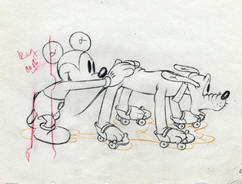Pluto Gets The Old Heave-Ho
 Capping years of intense debate, astronomers resolved Thursday to demote Pluto in a wholesale redefinition of planethood that is being billed as a victory of scientific reasoning over historic and cultural influences. But the decision is already being hotly debated. Officially, Pluto is no longer a planet.
Capping years of intense debate, astronomers resolved Thursday to demote Pluto in a wholesale redefinition of planethood that is being billed as a victory of scientific reasoning over historic and cultural influences. But the decision is already being hotly debated. Officially, Pluto is no longer a planet."Pluto is dead," said Mike Brown, a planetary scientist at the California Institute of Technology who spoke with reporters via a teleconference while monitoring the vote. The decision also means a Pluto-sized object that Brown discovered will not be called a planet. "Pluto is not a planet," Brown said. "There are finally, officially, eight planets in the solar system." The vote involved just 424 astronomers who remained for the last day of a meeting of the International Astronomical Union in Prague.
"I'm embarrassed for astronomy. Less than 5 percent of the world's astronomers voted," said Alan Stern, leader of NASA's New Horizons mission to Pluto and a scientist at the Southwest Research Institute. "This definition stinks, for technical reasons," Stern told Space.com. He expects the astronomy community to overturn the decision. Other astronomers criticized the definition as ambiguous.
The word "planet" originally described wanderers of the sky that moved against the relatively fixed background of star. Pluto, discovered in 1930, was at first thought to be larger than it is. It has an eccentric orbit that crosses the path of Neptune and also takes it well above and below the main plane of the solar system. Recent discoveries of other round, icy object in Pluto's realm have led most astronomers to agree that the diminutive world should never have been termed a planet.
The resolution: The decision establishes three main categories of objects in our solar system.
Planets: The eight worlds starting with Mercury and moving out to Venus, Earth, Mars, Jupiter, Saturn, Uranus and Neptune.
Dwarf planets: Pluto and any other round object that "has not cleared the neighborhood around its orbit, and is not a satellite."
Small solar system bodies: All other objects orbiting the sun.




3 Comments:
This is like the church councils in the old days that determined which views were orthodox and which heretical.
except there's no witches or stakes, and Jesus does not seem to be in the hizzouse. Other than that...yeah, exactly "like" that. :)
In a charming, neanderthal kind of way, yes, he's a dog, too. (scratching head).
Post a Comment
<< Home